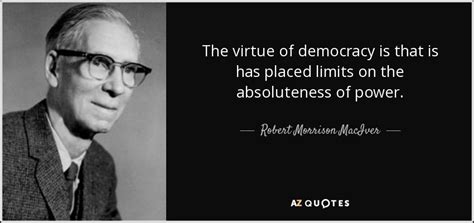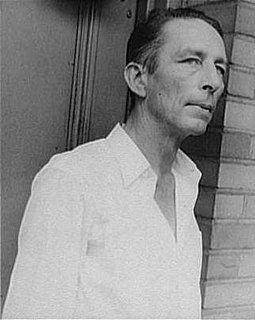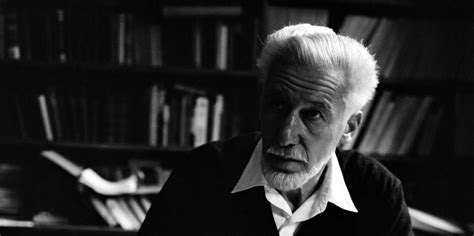A Quote by Aristotle
The saying of Protagoras is like the views we have mentioned; he said that man is the measure of all things, meaning simply that that which seems to each man assuredly is. If this is so, it follows that the same thing both is and is not, and is bad and good, and that the contents of all other opposite statements are true, because often a particular thing appears beautiful to some and ugly to others, and that which appears to each man is the measure
Related Quotes
We are apt to think we know what time is because we can measure it, but no sooner do we reflect upon it than that illusion goes. So it appears that the range of the measureable is not the range of the knowable. There are things we can measure, like time, but yet our minds do not grasp their meaning. There are things we cannot measure, like happiness or pain, and yet their meaning is perfectly clear to us.
Yet each man kills the thing he loves, By each let this be heard, Some do it with a bitter look, Some with a flattering word, The coward does it with a kiss, The brave man with a sword! Some kill their love when they are young, And some when they are old; Some strangle with the hands of Lust, Some with the hands of Gold: The kindest use a knife, because The dead so soon grow cold. Some love too little, some too long, Some sell, and others buy; Some do the deed with many tears, And some without a sigh: For each man kills the thing he loves, Yet each man does not die.
[K]now that however ugly the parts appear the whole remains beautiful. A severed hand Is an ugly thing, and man dissevered from the earth and stars and his history... for contemplation or in fact... Often appears atrociously ugly. Integrity is wholeness, the greatest beauty is Organic wholeness, the wholeness of life and things, the divine beauty of the universe.
A human being is not one thing among others; things determine each other, but man is ultimately self-determining. What he becomes - within the limits of endowment and environment- he has made out of himself. In the concentration camps, for example, in this living laboratory and on this testing ground, we watched and witnessed some of our comrades behave like swine while others behaved like saints. Man has both potentialities within himself; which one is actualized depends on decisions but not on conditions.
For a man can lose neither the past nor the future; for how can one take from him that which is not his? So remember these two points: first, that each thing is of like form from everlasting and comes round again in its cycle, and that it signifies not whether a man shall look upon the same things for a hundred years or two hundred, or for an infinity of time; second, that the longest lived and the shortest lived man, when they come to die, lose one and the same thing.
We all declare for liberty; but in using the same word we do not all mean the same thing. With some the word liberty may mean for each man to do as he pleases with himself, and the product of his labor; while with others, the same word many mean for some men to do as they please with other men, and the product of other men's labor. Here are two, not only different, but incompatible things, called by the same name - liberty. And it follows that each of the things is, by the respective parties, called by two different and incompatible names - liberty and tyranny.
For, once man is declared 'the measure of all things,' there is no longer a true, or a good, or a just, but only opinions of equal validity whose clash can be settled only by political or military force; and each force in turn enthrones in its hour of triumph a true, a good, and a just which will endure just as long as itself.
When people see some things as beautiful, other things become ugly. When people see some things as good, other things become bad. Being and non-being create each other. Difficult and easy support each other. Long and short define each other. High and low depend on each other. Before and after follow each other. Therefore the Master acts without doing anything and teaches without saying anything. Things arise and she lets them come; things disappear and she lets them go. She has but doesn't possess, acts but doesn't expect. When her work is done, she forgets it. That is why it lasts forever.
Man has no individual 'I'. But there are, instead, hundreds and thousands of separate small 'I's, very often entirely unknown to one another, never coming into contact, or, on the contrary, hostile to each other, mutually exclusive and incompatible. Each minute, each moment, man is saying or thinking, 'I'. And each time his 'I' is different. Just now it was a thought, now it is a desire, now a sensation, now another thought, and so on, endlessly. Man is a plurality. Man's name is legion.
Service is the measure of greatness; it always has been true; it is true today, and it always will be true, that he is greatest who does the most of good. Nearly all of our controversies and combats grow out of the fact that we are trying to get something from each other--there will be peace when our aim is to do something for each other. The human measure of a human life is its income; the divine measure of a life is its outgo, its overflow--its contribution to the welfare of all.
Conscience is the voice of the soul, the passions are the voice of the body. Is it astonishing that often these two languages contradict each other, and then to which must we listen? Too often reason deceives us; we have only too much acquired the right of refusing to listen to it; but conscience never deceives us; it is the true guide of man; it is to man what instinct is to the body; which follows it, obeys nature, and never is afraid of going astray.









































